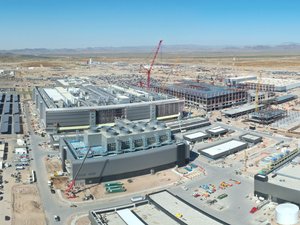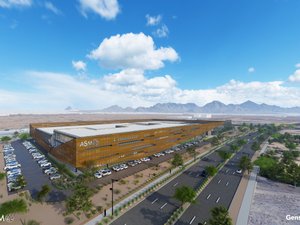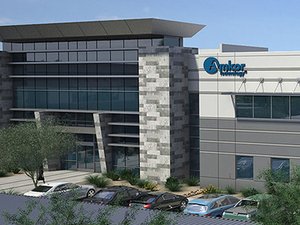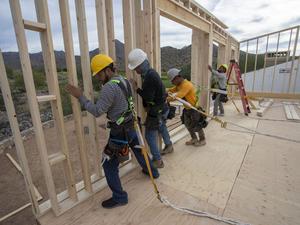
I’m not that different from most people who spend the year’s end taking stock of what has happened since January.
For readers of this column, you likely would agree that what I’ve brought to light this year was ongoing proof that 2023 was filled with examples of people, businesses and organizations working together to help take Arizona to a higher level.
If you’re new to this column, allow me to touch on highlights from this year. Through it all, you no doubt will recognize the power of collaboration.
Close to my own home, consider the SciTech Institute, a collaborative initiative of the Arizona Technology Council and Arizona Commerce Authority. (I am president and CEO of both the Institute and the Council.) The Institute teamed with TSMC and Deer Valley Unified School District to support Taiwanese students new to the country in connecting with each other, their American peers and their school communities through science, technology, engineering and mathematics (STEM).
Why was this significant? For those who don’t know, TSMC — otherwise known as Taiwan Semiconductor Manufacturing Company — is building a multibillion-dollar semiconductor manufacturing facility in the north Valley that is expected to be ready for production in 2025.
When it comes to semiconductors, the Council’s Q1 2023 Arizona Technology Industry Impact Report revealed the state’s chip manufacturing industry employed more than 24,000 Arizonans—more than three times the national average. Keep in mind that the TSMC site alone is expected to have more than 4,500 employees when the campus is ready.
Gov. Hobbs, ACA support tech initiatives
Critical to TSMC’s success has been the support from state officials. Leading the effort has been Gov. Katie Hobbs, who has said, “My administration is committed to fostering this important partnership and growing our semiconductor and advanced manufacturing ecosystem.”
The governor and her administration have been solid partners of the Council. That especially includes the Arizona Commerce Authority, headed by longtime friend, president and CEO Sandra Watson. Both she and the governor agree with the Council that education is key to our success as a state.
A shining example has been Arizona State University, which also has been reaching out to make a mark. For example, ASU has teamed with Amazon Web Services to launch the ASU Smart City Cloud Innovation Center Powered by AWS, an initiative focused on creating smarter communities in the Phoenix metropolitan area using the AWS Cloud to solve pressing community and regional challenges.
ASU also is home to the Quantum Collaborative that is connecting top scientific programs, initiatives, facilities, leading quantum information science and technology talent, and industry partners to advance the science and engineering of quantum information science, train the quantum workforce of tomorrow, and drive U.S. quantum economic advantage.
ASU’s role in producing talent goes even farther. A prime example is NEXTGen IT, a collaboration of ASU/AZNext, the U.S. Department of Labor, Tekletics and Impact Technology focused on creating and retaining IT jobs here and the rest of the nation, U.S.-based IT delivery at offshore pricing, and training that targets reskilling, upskilling, and diversity, equity and inclusion.
Battery, solar power players ramp up operations
Arizona itself also has made an impact on the technology front. It has collaborated with other states to regionalize our electricity grid through a regional transmission organization (RTO). By investing in Arizona’s clean energy economy and establishing strategic partnerships in an RTO, the state can attract more technology companies to continue growing our state’s already booming tech sector.
Speaking of power, important industry players including solar module manufacturer Meyer Burger, battery cell developer KORE Power and lithium-ion battery recycling facility Li-Cycle have made headlines for ramping up their operations in Arizona. On a related front, nearly 5,000 Arizona workers at 16 separate companies are making and servicing zero-emission trucks and buses.
Adding to all that is the Inflation Reduction Act, which has generated interest in Arizona beyond our borders. South Korea company LG Energy Solution has resumed a U.S. battery project in Queen Creek with a $5.6 billion investment to qualify for federal incentives included in the act.
And that’s just one part. A conditional commitment for an $850 million loan from the U.S. Department of Energy’s Loan Programs Office under the Advanced Technology Vehicles Manufacturing Loan Program will be used to fund the construction of KORE Power’s advanced battery cell manufacturing facility in Buckeye.
Arizona foreign direct investment continues
You might be thinking all this signaled Arizona’s finest hour and now we’re on our own. Hardly. In fact, the world is noticing us.
The momentum actually began in 2022, a year when Arizona had $58.5 billion in foreign direct investment — the most for any state. Nearly all the funding went to technology and manufacturing.
While there is no official tally for 2023 since one month remains in the year, I’m hearing that we can expect nearly the same level of investments and the momentum should carry into 2024. Besides funding from overseas, money also is coming from California, Illinois, Oregon and Washington.
As for the sectors of interest in the new year, expect to hear more about generative artificial intelligence as it produces new content such as text, images, audio and video. Add to that investments in clean energy and e-mobility. And with global conflicts arising, the aerospace and defense industries should be quite active.
We most definitely haven’t reached this point overnight. I would argue we have reached the tipping point. After decades of observing and participating in tech communities here and elsewhere, I know this all has been decades in the making by countless numbers of people.
Because of the results by collaborators building on the successes of one another, expect more of the world to come calling on Arizona in the years to come.
Steven Zylstra is president and CEO of the Arizona Technology Council.











